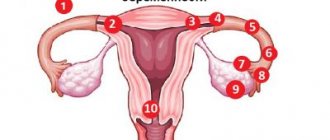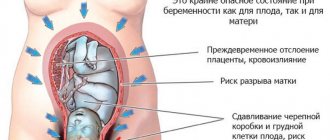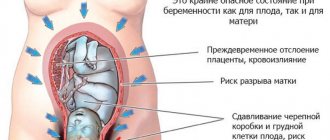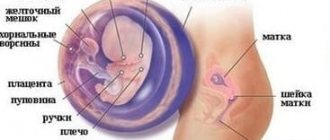Rating: 5/5 (1)
More than 60% of pregnant women are diagnosed with uterine tone . Why does the uterus become toned during pregnancy? Doctors say that hypertonicity is not a disease at all, but a symptom that signals that certain processes are occurring in the body of a pregnant woman.
Western doctors are even more loyal to the tone of the uterus: they believe that muscle tension is physiological in nature and does not need adjustment. Both Western and our doctors agree on one thing: if increased tone is detected, additional research must be carried out in order to prevent possible deviations and threats.
What is uterine tone during pregnancy?
What does a toned uterus mean during pregnancy? Before we talk about the definition of the concept of “uterine tone,” let's understand the structure of the uterus itself .
The uterus consists of three layers: perimeter, myometrium and endometrium. The middle layer, the myometrium, is muscle tissue. The myometrium is responsible for the tone of the uterus. During pregnancy, it stretches and relaxes, creating the most comfortable conditions for the baby. On the eve of childbirth, the myometrium begins to actively contract, helping the baby to be born.
Unauthorized contraction of the myometrium is the symptom called “uterine tone.” If, for various reasons, the muscles of the uterus begin to contract out of schedule, doctors talk about hypertonicity . Don’t be upset when you hear about this diagnosis: very often hypertension occurs for natural reasons. For example, a woman may become nervous during a gynecological examination, and the doctor will feel uterine contractions.
Short-term muscle contractions are not dangerous. But prolonged hypertonicity, as well as the presence of additional symptoms, such as a feeling of discomfort, cessation of fetal movements, may be a reason to prescribe additional studies.\
Fetus at 36 weeks of gestation: movements, development, weight and size
It seems that all the space in the tummy has already been occupied, and there is nowhere else to grow, but the height and weight of the fetus continues to increase. At week 36, the baby has stretched up to 47 cm and possibly even more, body weight can exceed 2,600 g. His cheeks and shoulders are rounded, subcutaneous tissue has formed, and fat has appeared.
Of course, such a hero has no room to accelerate, but he continues to flounder and does not stop moving. Listen to them - they can tell you a lot about things. Thus, excessive activity, which is even sometimes painful for the mother, will tell about the inconveniences experienced by the baby due to insufficient oxygen supply or the mother’s uncomfortable position for him. The absence of the baby's movements for even several hours is also an alarming signal, and if present, you should immediately go to the doctor.
On average, at 36 weeks of pregnancy, the mask makes itself felt approximately once every 10-15 minutes. In 12 hours, the baby responds at least 10 times. The baby's jolts and movements are felt very well, but by the end of pregnancy, when the baby grows even more and takes the position before the “start” from the belly, the number of its tangible and intangible movements will decrease by half.
The baby is already the same as you will see him for the first time, but the bones of the skull remain quite soft, flexible and pliable - this is necessary to overcome obstacles on the way to this world and facilitate passage through the narrow birth canal. During childbirth, the baby's head may even become deformed to protect the brain from injury. Nature is unsurpassed in its wisdom!
Future mom
She even cares about the expectant mother. And your sleepless nights are now preparing your body for the night mode after childbirth: the baby will require a lot of attention. However, this doesn't mean you don't need sleep. Find your formula for pre-night calm. Drink less liquid at night, listen to music, ask your husband for a massage, don’t lie on the couch all day so that you can’t find a place in bed later.
Be careful and prudent throughout the day. Do not make sudden movements, do not walk or stand a lot, control your posture: bending backwards, you increase the load on the spine; bending forward, you create a risk of falling due to a shifted center of gravity.
All unpleasant symptoms may intensify even more during this period. Under pressure from the uterus, the bladder and intestines work more actively, driving you to the toilet more often than you like. Your legs may swell more and more - be sure to lift them to an elevated position several times a day. At times you may even feel like you are suffocating - get on all fours, take a deep breath and exhale. However, from the 36th week of pregnancy, the tummy can gradually drop down, opening air access to the lungs. Although some mothers suffer from shortness of breath until the last day of pregnancy. If the baby is in the correct position with his head down, wear a bandage. After giving birth, it will also help you a lot, so take it with you to the hospital right away.
Why is uterine tone dangerous at different stages of pregnancy?
Prolonged hypertension is dangerous . The consequences of uterine tone differ in name, but do not differ in essence. In the 1st trimester, muscle contraction can lead to cessation of development and spontaneous termination of pregnancy, death of the embryo.
especially dangerous in the early stages of pregnancy. It is at this time that contraction of the uterine muscles can prevent the embryo from attaching to the surface of the endometrium, and pregnancy “will not take place.”
At later stages, in the 2nd and 3rd trimester of pregnancy, the same consequences of uterine tone during pregnancy are called differently: spontaneous abortion and premature birth. In other words, a woman may lose her child .
Prolonged uterine tone is harmful to the fetus. The muscles of the uterus contract and compress the placenta. The placenta does not deliver the required amount of oxygen. A fetus that does not receive enough oxygen may experience oxygen starvation - hypoxia. Consequences of hypoxia: development and growth delay.
In later stages, uterine tone may be due to natural causes. The uterus “trains” and prepares for future births. Just as an athlete squeezes and unclenches his muscles to test their strength, so the uterus contracts and contracts, testing its own readiness for the upcoming “work.” So-called Braxton-Hicks contractions occur in some pregnant women after the 20th week.
General information
It is generally accepted that the onset of this period is considered the beginning of the ninth month of gestation. However, this assurance is considered partly correct, although the period indicates that the baby should be born in the next 2-4 weeks. However, in women, the tone of the uterus often increases significantly at 36 weeks of pregnancy.
At this time, you can be sure that the child is already formed, and his internal organs are ready to meet the outside world. It is also worth noting that all systems function at the proper level. The only thing to worry about is lung deficiency.
Position of the fetus in the womb at 36 weeks. Source: vagitnist-tyzhden.pp.ua
The primary lubricant that was on the child gradually disappears, but for many months it protected the baby from the effects of pathogenic bacteria and various harmful microorganisms. The gestation period of 36 weeks is associated with various positive aspects:
- The woman feels regular tremors;
- The expectant mother feels the baby's heartbeat;
- During an ultrasound examination, the contours of all organs and limbs are visible;
- It becomes possible to determine the periods of sleep and wakefulness of the baby.
The weight of the fetus has increased significantly, and from it one can judge how complete intrauterine development was. Often women feel increased uterine tone at 36 weeks of pregnancy. This is due to the fact that while in the womb, weight gain still occurs as it is actively preparing for birth. This condition is diagnosed in 85% of women.
Every day, starting from the moment the 30th week has arrived, the baby is actively gaining body weight, since almost complete formation of all systems and internal organs has already occurred. But, since the weight and volume of adipose tissue is too small, it will be extremely difficult for the child to survive outside the mother’s body without additional support.
On average, at this stage the baby weighs about 3-3.5 kilograms. Such a mass puts a significant load on the spine of the expectant mother. Starting from the 36th week, some deformations occur, due to which the pelvic bones stretch and move apart. This is why the tone of the uterus may increase.
The main reasons for this are the following conditions:
- A sharp push from the baby;
- Turning, lifting weights, changing body position by the expectant mother;
- Rapid increase in blood pressure.
It is also worth noting that an increase in uterine tone can occur as a result of training the reproductive organ and preparing it for the upcoming labor. At this stage, it is considered normal if this condition occurs within five times during the day, but if the child’s weight is less than 2.5 kg, there should be no more than three contractions.
Sudden movements and heavy lifting can increase uterine tone. Source: mama66.ru
In addition, experts pay attention to the fact that the longer the period of gestation, the more often a woman will experience increased uterine tone. In this case, doctors identify the following predisposing factors:
- Body weight slightly exceeds the norms that are typical for a period of 36 weeks (in such a situation, labor is often performed by caesarean section, since before it begins the baby can reach a weight of about 4 kg).
- The pelvic position of the fetus, in which the child’s head rests on the pelvic bones and the legs are directed towards the bottom of the reproductive organ, is considered normal, but if the child is across, then the tone will increase more often.
- When carrying two or more children, that is, during a multiple pregnancy, the muscles of the reproductive organ will become tense very often, and it is impossible to get rid of this.
It is important to understand that increased uterine tone is a pathological condition of the body for a pregnant woman, especially if it is observed constantly, but does not act as a physiological feature. A complication may be that with the tone of the uterus there may be oxygen starvation, which leads to impaired blood circulation and nutrition.
If a woman at 36 weeks feels that her uterine tone is increasing, which is causing her serious discomfort, this should be reported to the leading obstetrician. It is recommended that a pregnant woman stay in a maternity hospital, where she will receive qualified medical care and deliver birth if it begins prematurely.
Causes of uterine tone during pregnancy
Since hypertonicity is not a diagnosis, but a symptom, determining the causes of this condition is the primary task of a specialist. Only after determining the cause can treatment be prescribed.
Causes of uterine hypertonicity:
- Hormonal disorders . The hormone progesterone is responsible for the process of preparing the endometrium for the “implantation” of the fertilized egg and relaxing the muscles of the uterus. A lack of progesterone in the body leads to the fact that the muscles of the uterus are too dense and prevent implantation of the embryo.
- Rhesus conflict . The reason for the occurrence of Rh conflict is the difference in the Rh factor of the mother and father. A mother's body with a positive Rh factor reacts to a fetus that has received a negative Rh factor from its father as if it were a foreign body. As a result of Rh conflict, hypertonicity occurs.
- Infections and inflammatory processes are a common cause of uterine tone. Infectious diseases that are not fully treated or that occur after pregnancy lead to the fact that the uterus “loses peace.” Inflammation is accompanied by additional symptoms: itching, pain, discharge.
- Severe toxicosis . Toxicosis contributes to the development of uterine tone for physiological reasons. Severe vomiting leads to a sharp contraction of many muscles, including the muscles of the uterus. It is impossible to get rid of toxicosis, but its consequences can be minimized with the help of a special diet and medications.
- Uterine distension . The uterus can stretch excessively with polyhydramnios, multiple pregnancies, or too large a fetus.
- Medicines. Taking any medications during pregnancy should be treated with extreme caution. You simply may not be aware of the side effects of some medications. Even the most harmless means can lead to increased muscle tone.
- Stress is one of the most “popular” causes of tone. Pregnant women should not be nervous! In a stressful state, pressure rises, the muscles of the uterus contract, and the child suffers from a lack of oxygen.
- Abortion. Abortions preceding pregnancy often lead to the appearance of synechiae - intrauterine adhesions. In this case, pregnancy may occur with complications: uterine tone, bleeding, threat of miscarriage.
- Gas formation. During pregnancy, changes occur in different systems of the body, including the digestive system. Increased gas formation and impaired peristalsis sometimes lead to hypertonicity.
Tests and ultrasound
The thirty-sixth week of pregnancy is the optimal time for the following studies:
- biochemical blood test - to assess the general health of the mother, hemoglobin levels, hormones, etc.;
- test for HIV, sexually transmitted infections - to determine labor tactics;
- gynecological smear - will reveal the presence of pathogenic microflora;
- A general urine test will indicate possible problems in the functioning of the kidneys and urinary system.
You will also need to undergo a CTG: the fetal heartbeat can be used to diagnose hypoxia and other disorders in a timely manner.
Ultrasound at the 36th week of pregnancy is performed according to indications, if it has not been prescribed previously or for additional diagnostics with accompanying symptoms.
How to determine the tone of the uterus during pregnancy: symptoms
How does uterine tone manifest during pregnancy? Very often, the presence of uterine tone is detected during a gynecological examination or ultrasound. Interesting fact: sometimes the causes of hypertension lie in the woman’s condition on the eve of the examination. The pregnant woman gets nervous and the uterus contracts.
In hospitals where pregnant women are placed “for preservation”, the following trick is used for the purity of the experiment: a morning examination in bed. The doctor approaches the woman who has just woken up and quickly palpates her stomach. The pregnant woman does not have time to get scared, and it turns out that she does not have any hypertension.
Signs of uterine tone appear depending on the duration of pregnancy. In the early stages of pregnancy (1st trimester), symptoms of uterine tone are nagging pain in the lower abdomen , pain in the lumbar region. In the 3rd trimester, as a symptom of uterine tone during pregnancy, a woman experiences tension and a feeling of heaviness . The abdomen seems to turn to stone, becomes dense, and changes shape.
What discharge can be considered normal?
Discharge is a very important part of pregnancy and needs to be monitored constantly. By week 36, the amount of discharge increases noticeably. In addition, they become more viscous - this indicates the gradual removal of the mucous plug that covers the cervix. If the mucus changes color from clear to pinkish or brownish, labor will soon begin.
If the mucus changes its color to pronounced yellow, gray or green, this means that an infectious process has begun. Also deviations from the norm are impurities in the form of flakes and pus, the presence of pain and itching in the genitals. If any of the above is present, you should urgently consult a doctor. Contracting an infection at such a late stage can have a very bad effect on the baby.
You should immediately consult a doctor if red bloody discharge appears. This may be due to placental abruption, which is dangerous for both the baby and the mother.
If copious watery discharge appears, this is a sign that labor has begun. Although there is a possibility of injury to the membranes. Sometimes amniotic fluid does not flow out overnight, but little by little. This is manifested by an increase in yellowish, odorless discharge. Then you can buy a test at the pharmacy for the presence of amniotic fluid, and if this is it, then you need to quickly go to the hospital.
Diagnosis of uterine hypertonicity
Hypertonicity of the uterus can be a symptom of threatened miscarriage or premature birth. To avoid problems, you don’t need to be afraid, but you need to see a doctor regularly. Timely diagnosis can prevent the onset of dangerous consequences for the mother.
Uterine hypertonicity is determined based on a medical examination and ultrasound . By palpation, the obstetrician-gynecologist through the anterior abdominal wall can understand whether the uterus is in good shape. Also, to determine the tone of the uterus, a tonometer , the sensors of which are attached to the pregnant woman’s stomach.
Treatment of uterine tone during pregnancy
How to treat and what to do for uterine tone during pregnancy? With “normal” uterine tone, doctors most often do not prescribe hospitalization.
We are talking about inpatient treatment if hypertension is accompanied by additional symptoms : pain or bleeding. In this case, you must agree to hospitalization. You can’t provide yourself with bed rest at home, can you? It’s better to lie quietly in the hospital, and let your family learn to cope without you for a while.
To reduce the tone of the uterus without the use of drugs in a hospital setting, the following procedures are performed:
- endonasal galvanization;
- electrophoresis with magnesium;
- electroanalgesia;
- electrorelaxation.
If, from the doctor’s point of view, manifestations of hypertonicity are not so dangerous, then outpatient treatment is prescribed with mandatory bed rest . To reduce the tone of the uterus during pregnancy, antispasmodic and sedative drugs are prescribed: “No-shpa”, “Papaverine”, “Magne-B6”. If the cause of hypertension lies in a lack of progesterone, hormone-containing drugs are prescribed: Utrozhestan or Duphaston.
How to relieve or slightly reduce the tone of the uterus during pregnancy at home? Lie down, calm down, forget about your household chores. Delegate housekeeping responsibilities to your husband. Take motherwort or valerian tincture. Remember that the most important thing for you now is the baby’s health, relax and finally get some sleep. As a rule, timely rest and taking natural or medicinal drugs (Magne-B6, for example) have the desired effect. Hypertonicity recedes and life gets better!
Prevention of uterine hypertonicity
Your task is to prevent an increase in the tone of the uterus during pregnancy. First of all, find out about your health problems before you conceive.
Get examined , cure infectious diseases, correct hormonal levels. Modern medicine knows and can do a lot, but it needs your help. Timely identification of health problems will help avoid unpleasant “surprises” during pregnancy.
Do not be nervous. Remember that your baby’s health is in your hands. Shield yourself from troubles and do not react to negative phenomena. Don't be shy about asking your loved ones to help you. If you have the slightest ailment, rest. According to your doctor's instructions, go to the hospital. Not so much to get treatment, but to get rid of problems at home. Doctors are well aware that they won’t let you rest at home, so they often prescribe hospital care “for prevention.” Take advantage of your position.
Interesting Facts
| Options | Indications |
| Time from conception | 34 weeks |
| Period by month | 36 weeks |
| What month | 9 |
| Dimensions and weight of the fetus | 475 mm, 2600 g |
| Uterus dimensions | VDM - 32-34 cm |
| Pregnant weight | Gain from the beginning of pregnancy is 10-14 kg; over the last week 400-500 g |
Your baby is the size of
Papaya
475 mm Size
2600 g Weight
Congratulations! You are at the finish line. By the end of the 36th week of pregnancy, all organs and systems of the baby are fully formed. Now he is engaged in building up fat tissue. Your task is to accumulate strength, rest at the first opportunity and tune in to a positive mood.
Recommendations for pregnant mothers
A pregnant woman instinctively feels what she needs. Trust your body, remember your intuition. Do you want fruit? This means your body needs vitamins. Need a rest? Immediately drop everything and “collapse” on the sofa.
Here are some more useful recommendations from moms and doctors:
- Adjust your diet to include as many fruits and vegetables as possible.
- If doctors have prescribed bed rest for you, do not act as a hero to the detriment of your baby. You need to lie down - lie down!
- Do not neglect medications prescribed by your doctor. The drugs will relax the muscles and bring the uterus back to normal.
- Drink at least 1.5 liters of water per day, except in cases where large amounts of fluid are contraindicated (polyhydramnios, edema).
- Take a walk, do exercises for pregnant women.
- Avoid excessive physical activity. Pregnancy is not the time for lifting weights and sprinting.
- Change your wardrobe. Put away tight clothes and instead buy special trousers with elastic at the top and a “blouse-blouse”.
Video about uterine tone during pregnancy
We invite you to watch the video in which you will find answers to many questions. Why does increased uterine tone occur? In what cases is this considered the norm, and in what cases is it not? Why do some women not have this diagnosis in early pregnancy?
Dear mothers, present and future! We all know what a huge responsibility lies on your shoulders. Let's help each other: let's share our experiences. Don't be shy, tell your stories, ask questions, argue. Let your advice and recommendations help other pregnant women understand their condition, overcome fear and turn into calm mothers beaming with blissful smiles.








